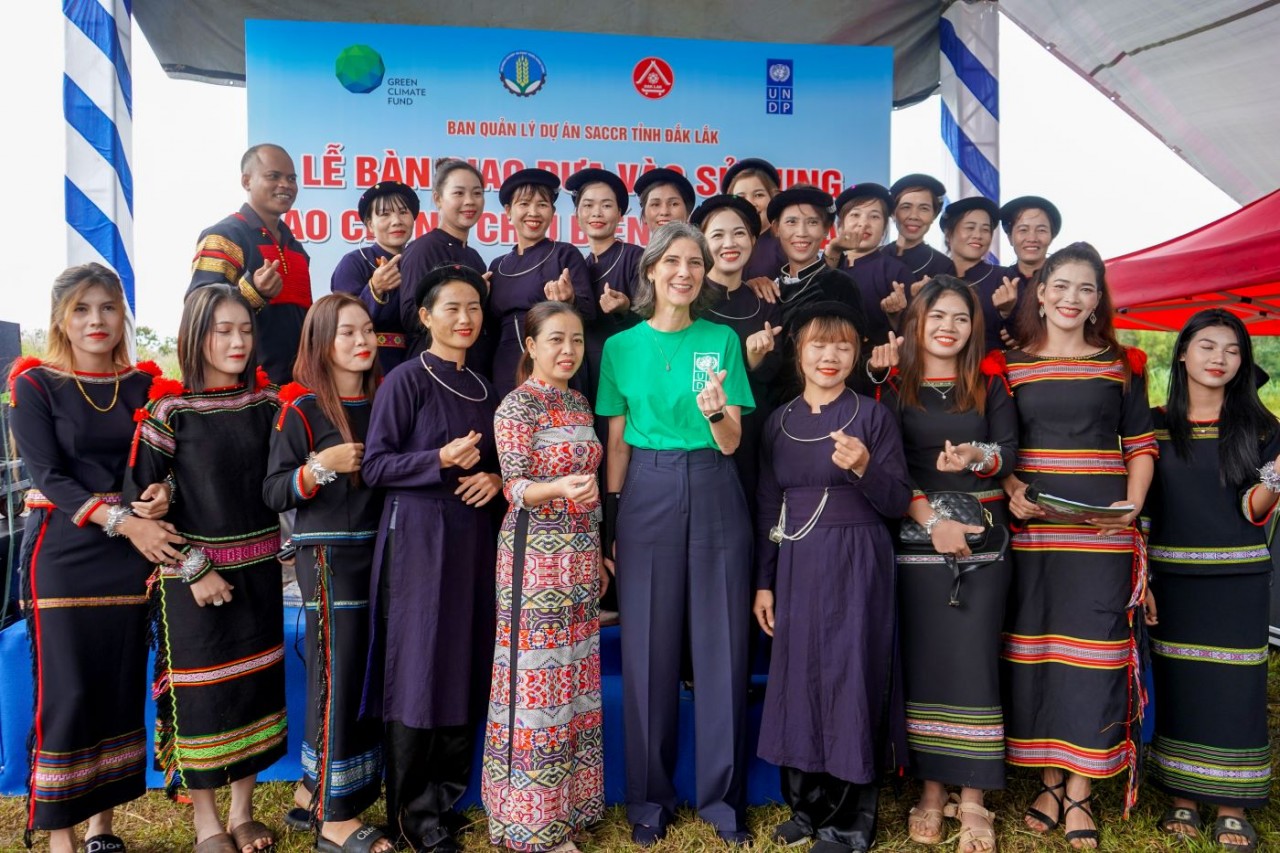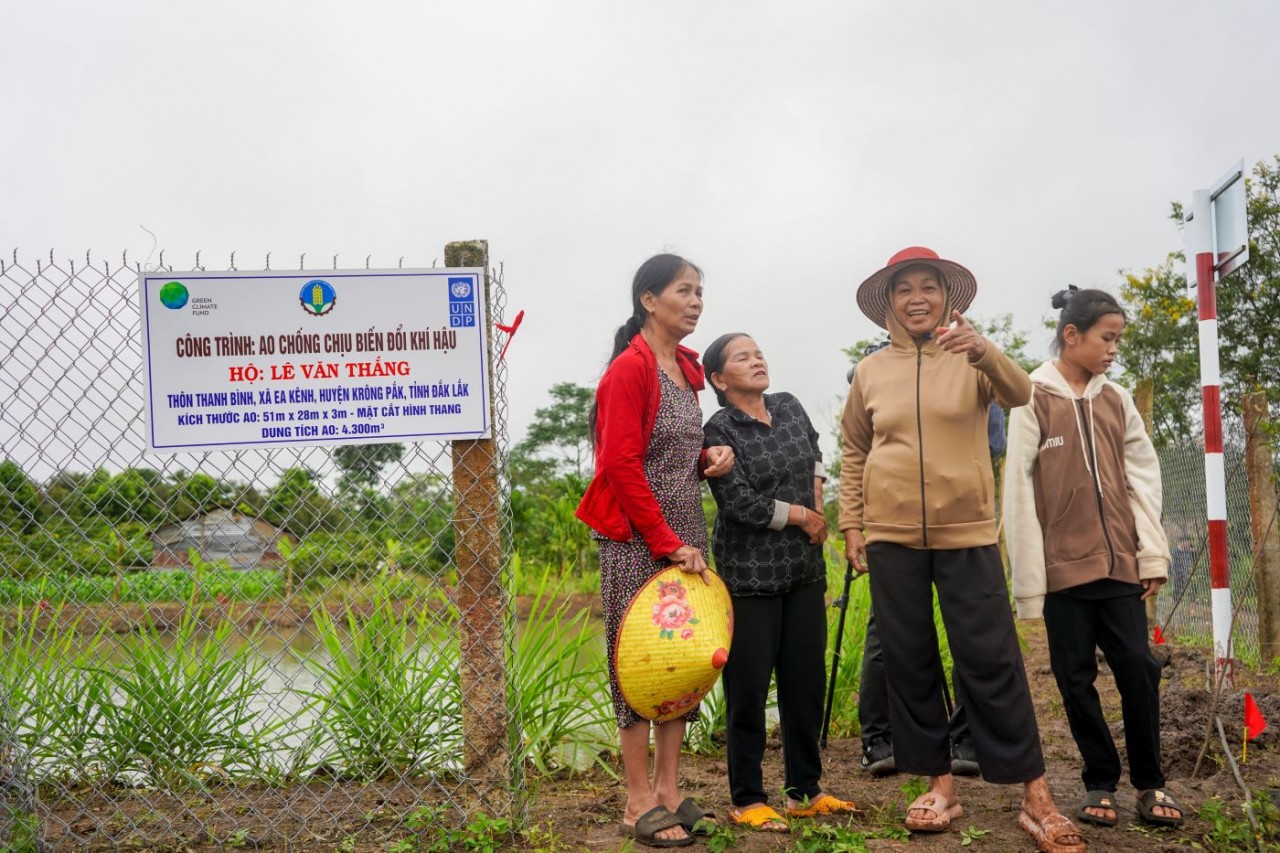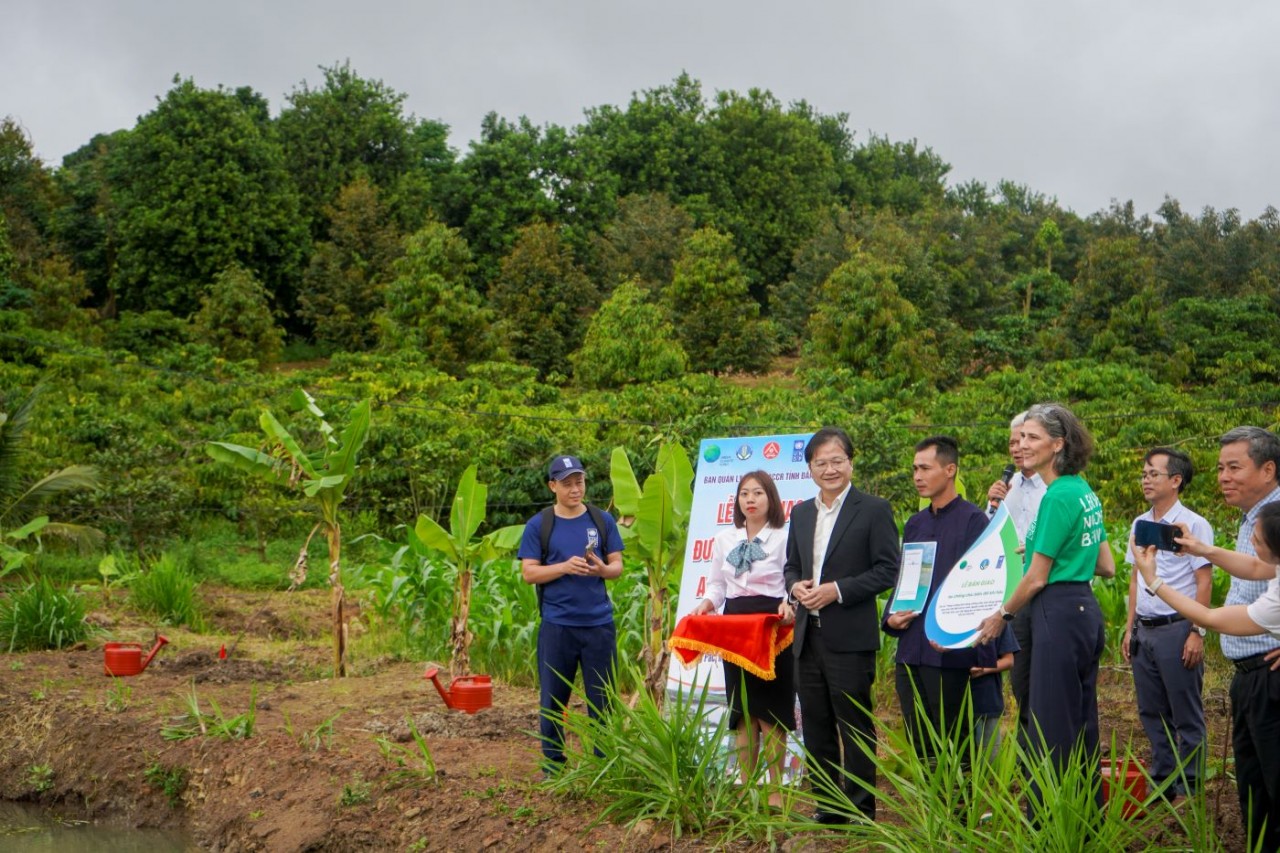
Climate-resilient ponds to cope with the upcoming dry season
Latest
 |
| Ms. Ramla Khalidi, UNDP Resident Representative in Vietnam at the handover ceremony of the climate-resilient pond to people in Dak Lak province. (Photo: UNDP Vietnam) |
The United Nations Development Program (UNDP) coordinated with the Central Office for Water Resources Projects (CPO), Ministry of Agriculture and Rural Development, and Department of Agriculture and Rural Development of Dak Lak to organize the handover of climate-resilient ponds to people. The activity within the framework of the project "Strengthening the Resilience of Small-holder Agriculture to Climate Change-Induced Water Insecurity in the Central Highlands and South-Central Coast Regions of Viet Nam", also known as SACCR Project.
The project is financed by the Green Climate Fund and implemented by UNDP, the Ministry of Agriculture and Rural Development, and the People's Committees of Dak Lak, Dak Nong, Khanh Hoa, Ninh Thuan, and Binh Thuan provinces.
With a peak of the dry season months from December of the previous year to March of the following year, Dak Lak always faces a water shortage for crop irrigation. Many irrigation constructions, mainly small lakes and dams, have fallen into the "dead" water level, making agricultural production activities face many difficulties because the existing surface water source only meets about 40% of the demand.
According to preliminary statistics of Dak Lak's agricultural sector, by the end of March 2023, more than 1,300 hectares (rice, dry crops) had dried up, leading to the possibility of total loss; nearly 160,000 hectares (coffee, durian, pepper, macadamia, and fruit trees) lack irrigation water in the next batches.
In the face of increasingly intensive and severe droughts, the drought-combating solution is always in urgent demand. The project has supported the construction of climate-resilient ponds for poor, near-poor, ethnic minority, and economically women-dependent households. In Dak Lak province, by October 30, 2023, the project has completed 70 ponds in 2 districts Krong Pac (34 ponds) and Ea Kar (36 ponds). The total capacity of 70 ponds is more than 60,000 m3, with an irrigation area of more than 52 hectares.
At the handover ceremony of the climate-resilient pond, Mr. Le Van Thang - a representative of the beneficiary households, thanked the project for its support. He said: "Previously, my house had a small pond to store water, but every year, it was only enough to irrigate about twice in the dry season before the water ran out, so the number of crops grown in my garden was often lacking water, reducing the productivity and family income. My family often planned to expand the pond to have enough water for irrigation in the dry season. However, I could not do it because of difficult economic conditions. Recently, my family has been very happy and fortunate to receive the attention and support from the SACCR Project in Dak Lak province to bring machinery to dig the pond wider and deeper. Since then, my pond has been able to hold more water. On behalf of the beneficiary households, I thank the project for this practical support."
 |
| The project has supported the construction of climate-resilient ponds for poor, near-poor, ethnic minority, and economically women-dependent households. (Photo: UNDP Vietnam) |
"The province's agricultural sector has also had many synchronous solutions to support farmers in farming in the context of climate change, such as Building new and upgrading irrigation works, canal systems, and converting suitable crop structures. However, support for small-holder farmers still has many difficulties and limitations. Therefore, the pond support activity for small-holders in the SACCR Project area is especially important in the current climate change situation," said Mr. Nguyen Hoai Duong - Director of the Department of Agriculture and Rural Development.
Ms. Ramla Khalidi, UNDP Resident Representative in Vietnam, shared: "This is one of 70 ponds we are handing over this time. Out of 260 ponds, we will deliver in Dak Lak through the SACCR Project. This pond results from effective cooperation between the Ea Kenh commune community, local government, provincial government, Ministry of Agriculture and Rural Development, and construction contractors. The project has the goal of building and renovating more than 1,500 rainwater harvesting ponds, including 260 ponds in Dak Lak."
"Water is one of the most important factors for plants to grow. Drought, El Nino, and climate change are having a negative impact on water resources. Digging ponds to collect rainwater is a good solution to adapt to the impacts of climate change. We hope that beneficiary households will learn about this project's resilient pond model and replicate it," she added.
Mr. Pham Dinh Van - Head of the Central Office for Water Resources Projects (CPO) under the Ministry of Agriculture and Rural Development, also appreciated the efforts of the local community and the project: "Up to now in Dak Lak, 70/260 ponds have been completed. Mr. Le Van Thang's pond in Ea Kenh commune is one of the ponds of the project that has been completed and handed over. We will continue to coordinate with DARD and pond management households in training, coaching, and guiding activities to ensure effective use of rare water resources in the dry season not only in Dak Lak but throughout the project."
 |
| SACCR project aims to improve water security and protect the livelihoods of small-holder farmers in the region. (Photo: UNDP Vietnam) |
The project "Strengthening the Resilience of Small-holder Agriculture to Climate Change-Induced Water Insecurity in the Central Highlands and South-Central Coast Regions of Viet Nam" was implemented to improve water security and protect the livelihoods of small-holder farmers in the region. By 2026, it is expected that 1,507 climate-resilient ponds will be built, handed over, and put into use operation. In Dak Lak province, the project will create 917 new last-mile connection systems, build and upgrade 260 climate-resilient ponds, support the establishment of 2,335 on-farm water-saving irrigation systems, and training on climate change adaptive agriculture through Farmer Field School (FFS) for 5,838 households, supporting agricultural materials for 2,335 households, and improving access to market, credit and agricultural climate information services for 29,980 small-holder farmer families in the project area.

















